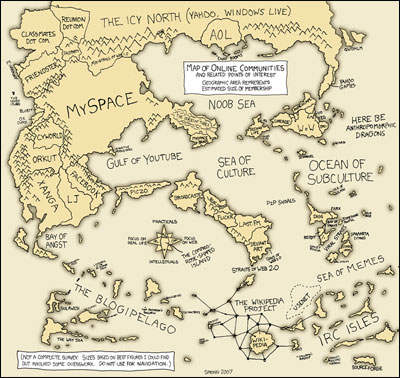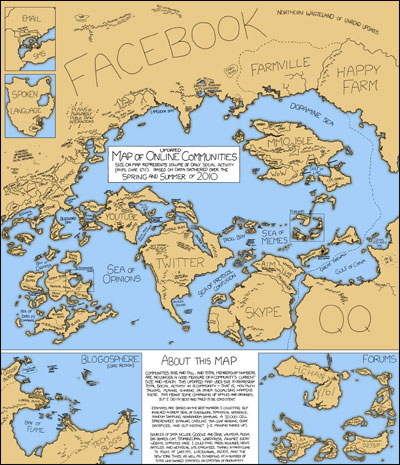“A Homogenous, Cancerous, Rhizomatic Junkspace”

Map of the Online Communities by XKCD, viagra 2007. Larger version.
J.G. Ballard one said that his biggest fear was that the future would be boring. He feared the future would be “a vast, conforming suburb of the soul.” The notion, as applied to the Internet, was recently explored in two pieces on the changing face of internet culture.
Both are wonderfully-written, playful and full of insight. The first of these The Death of the Cyberflâneur, an opinion piece penned by Evgeny Morozov for the New York Times.
Thanks to the French poet Charles Baudelaire and the German critic Walter Benjamin, both of whom viewed the flâneur as an emblem of modernity, his figure (and it was predominantly a “he”) is now firmly associated with 19th-century Paris. The flâneur would leisurely stroll through its streets and especially its arcades — those stylish, lively and bustling rows of shops covered by glass roofs — to cultivate what Honoré de Balzac called “the gastronomy of the eye.” … it’s easy to see, then, why cyberflânerie seemed such an appealing notion in the early days of the Web. The idea of exploring cyberspace as virgin territory, not yet colonized by governments and corporations, was romantic; that romanticism was even reflected in the names of early browsers (“Internet Explorer,” “Netscape Navigator”). …
In the second half of the 19th century, Paris was experiencing rapid and profound change. The architectural and city planning reforms advanced by Baron Haussmann during the rule of Napoleon III were particularly consequential: the demolition of small medieval streets, the numbering of buildings for administrative purposes, the establishment of wide, open, transparent boulevards … But if today’s Internet has a Baron Haussmann, it is Facebook. Everything that makes cyberflânerie possible — solitude and individuality, anonymity and opacity, mystery and ambivalence, curiosity and risk-taking — is under assault by that company. It’s easy to blame Facebook’s business model (e.g., the loss of online anonymity allows it to make more money from advertising), but the problem resides much deeper. Facebook seems to believe that the quirky ingredients that make flânerie possible need to go. “We want everything to be social,” Sheryl Sandberg, Facebook’s chief operating officer, said on “Charlie Rose” a few months ago.

Updated Map of the Online Communities by XKCD, 2010. Larger version here.
In response, Jesse Darling has penned a brilliant response essay titled Arcades, Mall Rats, and Tumblr Thugs over at The New Inquiry:
Evgeny Morozov writes from Palo Alto, a Californian charter city established by the founding father of Stanford University, at which Morozov is a visiting fellow. Palo Alto, nestled in a dewy corner of Silicon Valley, has been at various times home to Google, Paypal, Sun Microsystems and Hewlett-Packard: a prime piece of sun-drenched, Nor-Cal sprawl. Social media is to the Read/Write Web what sprawl is to the metropolis of modernity: a homogenous, cancerous, rhizomatic junkspace that expands exponentially outward on a sludgy wave of strip malls and sponsored links, greed and induced demand. This ruthless modernization produces miles of “junkspace” — a term coined by the architect Rem Koolhaas, who wrote that “more and more, more is more. Junkspace is overripe and undernourishing at the same time, a colossal security blanket that covers the earth in a stranglehold of seduction…
Junkspace is like being condemned to a perpetual Jacuzzi with millions of your best friends. Seemingly an apotheosis, spatially grandiose, the effect of its richness is a terminal hollowness, a vicious parody of ambition that systematically erodes the credibility of building, possibly forever.” Koolhaas was referring to the airport and the strip-mall and the single-zone sprawl, but he could have been talking about Facebook…. If space is a practiced place, then collective navigation produces the commons. Like mall rats flipping tricks in a parking lot, users exhibit a feral fluency in the use (and transgression, as it is reimagined daily) of this common timespace: we tune out the ads and get on with the serious business of flirting, hustling, hanging out and talking shit. We know that this serious business is affective labor which produces capital for the custodians of netspace; indeed, meme culture (including but not limited to YouTube parody, stock photo art, cut-ups and image macros) can be seen as the user asserting a subjectivity that exists and thrives despite (and beyond) her status as targeted marketing demographic. Like the Occupy movement, these activities amount to a kind of politics of the public (virtual) body in (virtual) space. We may never own the means of production as such, but will continue to assert, pervert and subvert the commons anyway: a gesture of post-corporeal territorial pissing which necessitates neither phallus nor spray-can nor html.
The Internet: Serious Business. Well-played.
On a tangentially related note:
